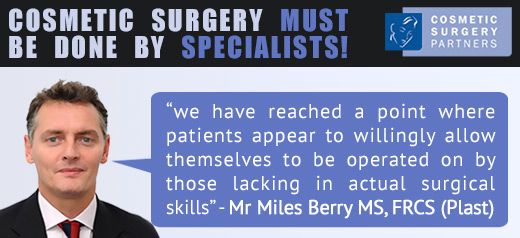Cosmetic surgery should be done by specialist surgeons

The BBC’s article about who should be performing Cosmetic Surgery (http://www.bbc.co.uk/news/health-30932585) is both welcome and long overdue. To those within the profession, it has long been one of those curious, and entirely illogical anomalies that anybody seems to be able to call themselves a ‘cosmetic surgeon’ with the bare minimum of surgical experience. Surgical training in the UK is long, with a minimum of 3 years at basic, and a further 6 at specialist level. All surgical specialties are competitive, with some including plastic surgery approaching 20 applicants for each training post. Consequently, extended training and super-specialist fellowships are more frequent than not, so 12 years and upwards of 10,000 hours expertise is not uncommon.
It is therefore more than a little irksome to hear of GP’s with just 4 years training (in General Practice) claiming skills in liposuction, dentists with no surgical training administering neurotoxin and the like. Whilst a great number of surgical procedures have been perfected over years to be relatively routine and risk minimal harm, the same may not be said for those that do not go according to plan. It is at this point, that the countless hours of experience of the genuine surgeon begin to pay dividends.
The law is also somewhat of an anachronism, as a custodial sentence may be applied for impersonating a police officer, but not it seems a surgeon. From the poor patient’s perspective it is not always easy to see beyond the marketing glitz, so regulatory assistance would be of great benefit. Although the General Medical Council does hold a Specialist Register, there is no category for Cosmetic or Aesthetic surgeon, so clarification is required. We would surely not have our hair cut by a non-hairdresser, so how have we reached a point where patients appear to willingly allow themselves to be sliced open by those lacking in actual surgical skills?
Written by Mr Miles Berry MS, FRCS (Plast) January 2015
Note: The article Miles is referring to on the BBC wesbite.





